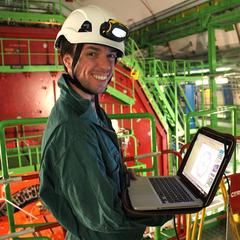URL: https://www.desy.de/news/news_search/index_eng.html
Breadcrumb Navigation
DESY News: CMS Achievement Award for DESY postdoc
News
News from the DESY research centre
CMS Achievement Award for DESY postdoc
Merijn van de Klundert, postdoctoral researcher in DESY’s CMS group, has been rewarded with one of the Achievement Awards that the international CMS experiment team hands out every year to few, especially young members of the collaboration. This is a recognition for scientists who have distinguished themselves by performing significant and lasting contributions to different components of the CMS experiment. CMS is one of the four gigantic experiments at CERN’s Large Hadron Collider LHC. Merijn van de Klundert receives the award for “outstanding contribution to the CASTOR project in CMS.”

Merijn van de Klundert at the CMS detector. Image: private
Recognising its potential in proton-proton collisions (alongside the heavy-ion ones it was deisgned for) DESY played a major role in this detector: its mechanics were constructed at DESY, and DESY researchers participated in the yearly installations and in data taking and the analysis. The CASTOR calorimeter actually elaborates and extends measurements made at DESY’s HERA accelerator for studying the structure of the proton. Besides, CASTOR data have also been used in analyses of heavy ion collisions. Overall the CASTOR research programme has surpassed all expectations in numbers of scientific publications and PhD theses, of which Merijn van der Klundert’s was one.
Van de Klundert has substantially contributed to the successful data taking and analysis of the data during his PhD, in which he also published the first pioneering analysis of jets in CASTOR. Currently, he is one of the driving forces for the publication of the performance of the detector as well as preparing the unique data sets taken with the CASTOR calorimeter for the public access. He joined DESY in 2018 as a postdoc after completing his PhD at the University of Antwerp in Belgium. He now works on studies of the characteristics of the Higgs particle, which was discovered at the LHC, and on studies for the high-granularity calorimeter for the CMS upgrade and future lepton colliders.



